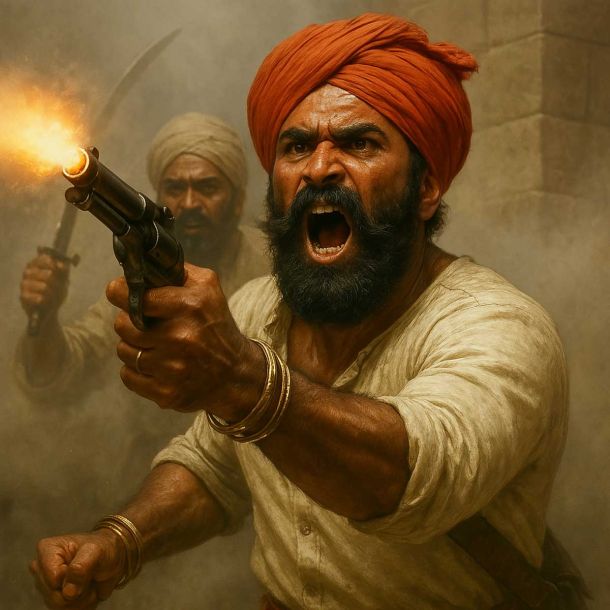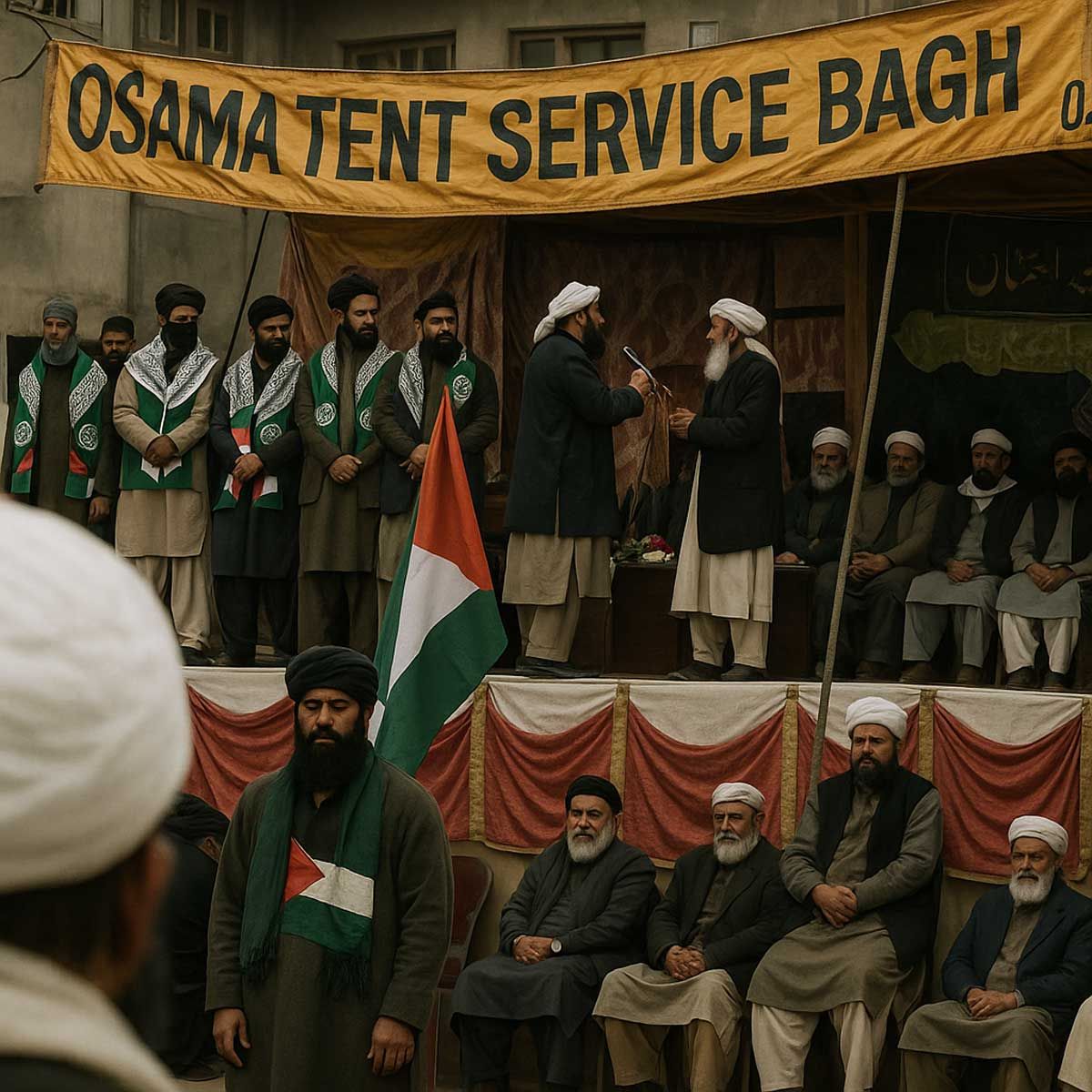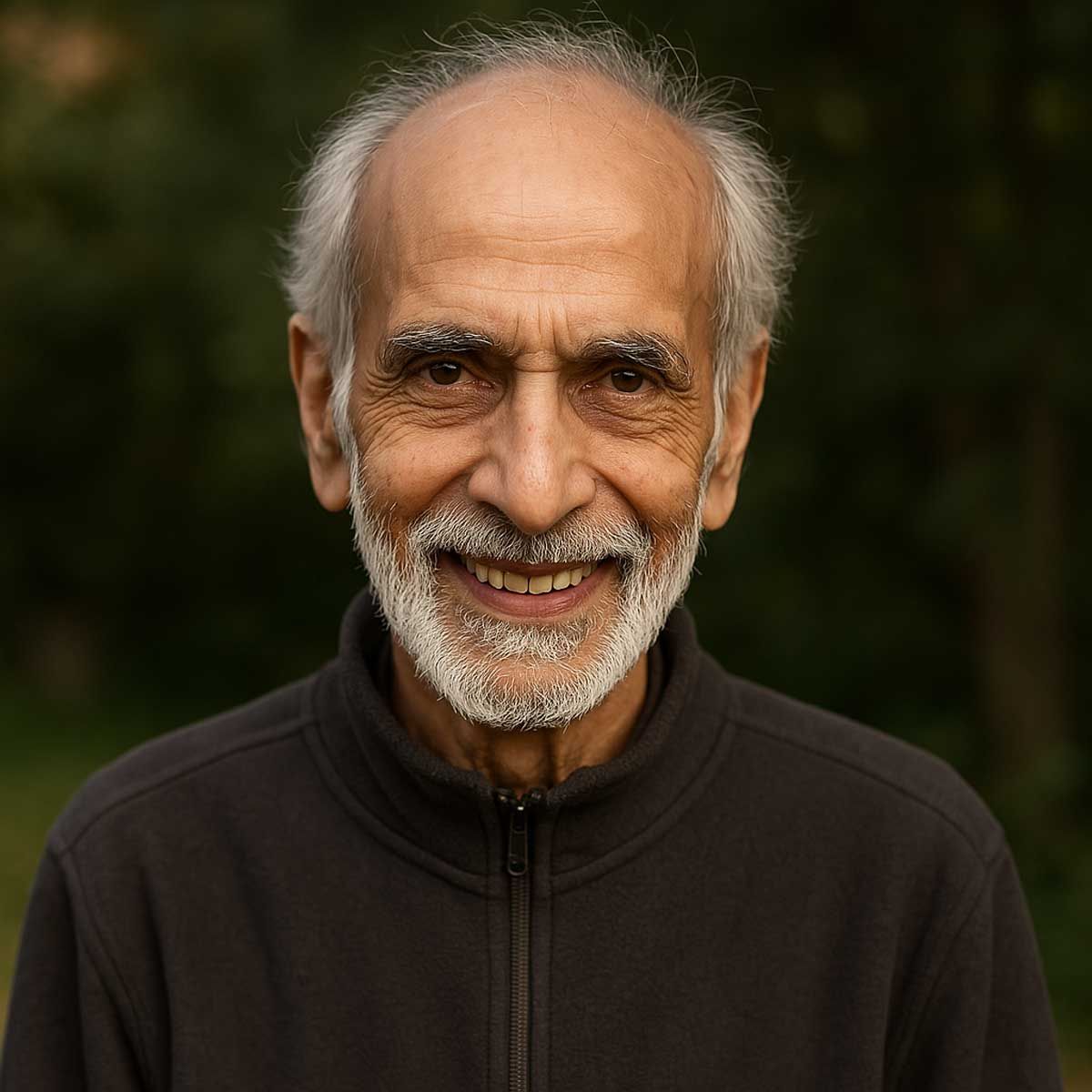Sanatan Articles
Satyaagrah
Written on
Satyaagrah
Written on
Satyaagrah
Written on
Satyaagrah
Written on
Satyaagrah
Written on
JOIN SATYAAGRAH SOCIAL MEDIA
"Article 1: India, That Is Bharat": And Seth Govind Das argued that the Constitution is incomplete and needs many amendments, "If a meeting is held in our country, shall we address the gathering ‘Ay Indians’?, we should give her the ancient name ‘Bharat’"

"We, the People Of India." The phrase resonates with deep emotions of pride, history, and unity. Such is the gravitas of our self-imposed Constitution that with these opening words, we pledge an unsaid duty to ourselves and our nation. But, as citizens of this vast and diverse land, do we truly understand the depth and implications of our Constitution? In order to appreciate and uphold the spirit of these written laws, it's imperative that we dive deep into the heart and soul of the Constitution – the debates, the interpretations, and the amendments.
Every article in our Constitution holds a narrative, a story. To fully grasp the essence of each article, one must not only read the lines but delve deep into the historical deliberations in the Constituent Assembly that crafted it. To comprehend the true nature of our Constitution's first Article, it isn't merely enough to read it. One must explore the extensive debates within the Constituent Assembly that shaped it, understand the interpretations of our esteemed Constitutional Courts - the Supreme Court of India and High Courts, and be well-versed with the amendments introduced by the Parliament of India over the years.
The illustrious author, in earlier discourses, had keenly highlighted two significant references. Firstly, the choice of words "ancient land" in the Objectives Resolution of January 22, 1947, by the Constituent Assembly, and secondly, the use of the term "Bharat" in Article 1 as synonymous with "India." These references are not mere words; they signify something profound. They stand as a testament to the acknowledgment by our Constitution's framers of the rich civilizational heritage and legacy that the Republic of India, or Bharat, carries with it.
It's intriguing, isn't it? A single word, a mere reference can carry the weight of centuries of history, culture, and legacy. Such is the power of our Constitution. However, it's pivotal to question and validate these contentions. Given that no provision of the Constitution stands isolated from its historical context, a meticulous examination becomes essential. The question then arises: Does the history of Article 1 support the author's contention?
The Constitution isn't just a set of rules and laws. It's a living testament to our journey as a nation, reflecting our ethos and values. As we navigate through its pages, each article, each word, tells us tales of our ancestral wisdom, debates of our forefathers, and the hopes of a nation. Understanding the genesis and essence of Article 1 isn't just an academic exercise; it's an emotional journey through the very soul of Bharat.
Diving deeper into the foundational texts of our Constitution, the Constituent Assembly debates stand as momentous gatherings where the very fabric of our nation was deliberated upon. As profound as these debates were, they also echo the passion, patriotism, and sentiment of a newly independent India, yearning for an identity reflective of its rich legacy.
On the significant date of 4th November 1948, Dr. BR Ambedkar, a name synonymous with the making of our Constitution, initiated a historic motion to introduce the Draft Constitution to the Constituent Assembly. The vast expanse of the document, however, did not escape critique. A day later, on the Assembly’s floor, Seth Govind Das, a distinguished member, raised a poignant query and critique that would steer the course of discussions for the days to come.
His passionate speech highlights the emotive underpinnings of our national identity. “For instance, our country has been named as ‘India’ in this Constitution. As far as the foreign countries are concerned, this name is alright. But if a meeting is held in our country which we have to address, shall we address the gathering ‘Ay Indians’?” The tone of his query was not just a reflection of linguistic choices but embodied the soul of our nation. He continued, “When we want to frame the Constitution of our country in our national language, when we want to make it a secular state, neither ‘India’ nor Hindustan are suitable names for this country. In my opinion, we should give this country the ancient name ‘Bharat’.”
Seth Govind Das' fervent words did not fall on deaf ears. They stirred the Assembly, sparking a series of discussions and suggestions. One such influential voice was M. Ananthasayanam Ayyangar from Madras. He proposed a thought-provoking amendment, suggesting the names— 'Bharat', 'Bharat Varsha', or 'Hindustan' as potential replacements for the term 'India' in Article 1, clause (1). Similarly, Lokanath Misra, representing Orissa, too, presented an amendment concerning the naming. However, given the significance of the matter, the assembly deemed it fit to postpone the discussion, allowing time for deeper contemplation.
The resolution to this profound debate came almost a year later. It was Dr. Ambedkar, the very architect of our Constitution, who proposed a significant amendment on 17th September 1949. He put forth: “India, that is Bharat, shall be a Union of States.” This proposal not only acknowledged the sentiments of the assembly members but also reverberated with the legacy of our ancient land.
The subsequent day saw a flurry of discussions, as the assembly delved into the implications of Dr. Ambedkar’s proposed amendment. The sentiment was clear - the Constitution was not just a legal document, but a reflection of our ancient heritage, traditions, and the collective aspirations of the people.
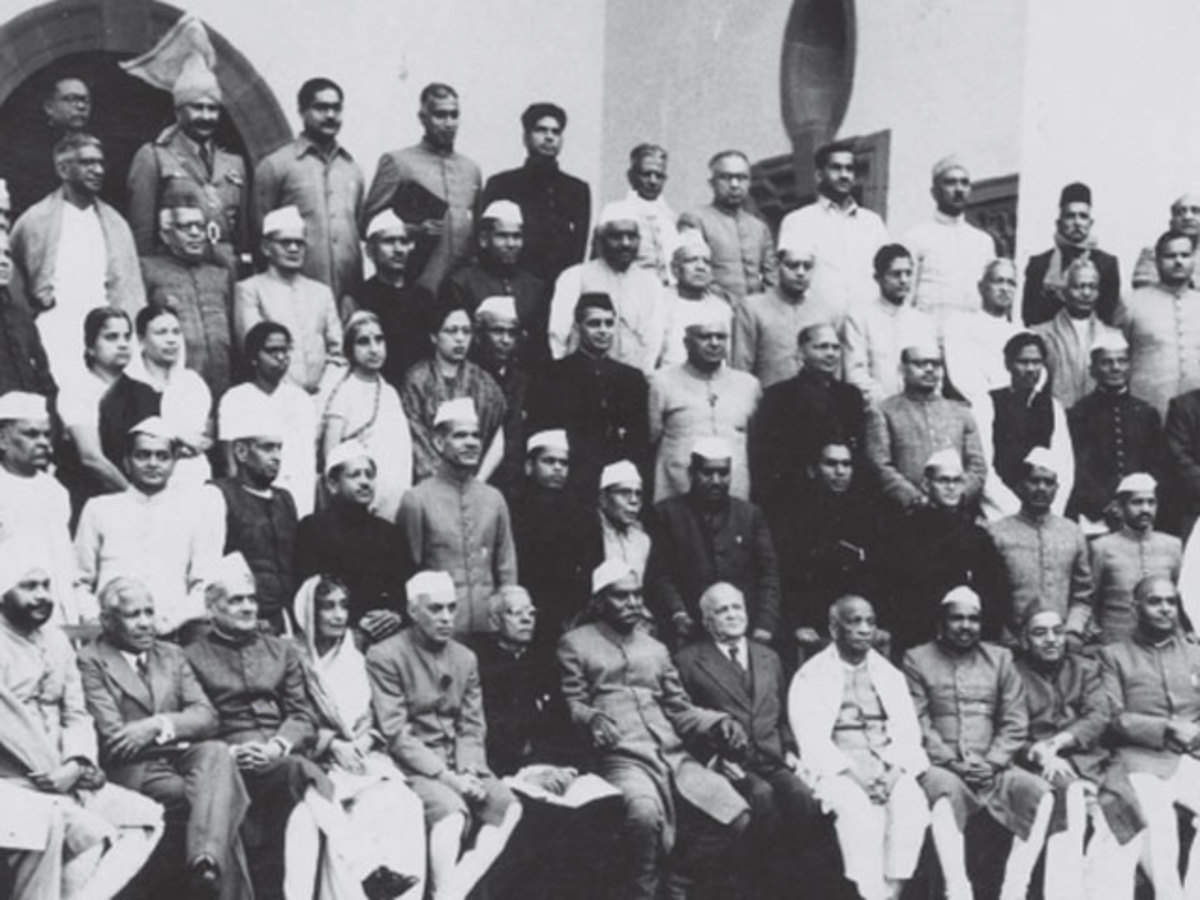 |
Committees of Constituent Assembly and their Chairman |
The construction of a nation's Constitution is no simple feat, especially when it's for a land as diverse and vast as ours. The Constituent Assembly was a cauldron of voices, emotions, and opinions, each echoing the hopes and aspirations of different corners of the nation. As they say, the devil is in the details, and perhaps one of the most debated details in the Assembly was the naming of our newly-independent country within its foundational document.
Taking a closer look at the genesis of the discussion, on November 15, 1948, the Constituent Assembly first laid its eyes on the Draft Constitution meticulously prepared by the Drafting Committee. The Draft Article 1, a pivotal section, read:
- (1) India shall be a Union of States.
(2) The States shall mean the States for the time being specified in Parts I, II, and III of the First Schedule.
(3) The territory of India shall comprise-
(a) The territories of the States;
(b) The territories for the time being specified in Part IV of the First Schedule; and
(c) Such other territories as may be acquired.
Across four significant dates, November 15, 1948, November 17, 1948, September 17, 1949, and September 18, 1949, the Assembly grappled with the weight of this Article, and more specifically, the naming of India.
Shri M. Ananthasayanam Ayyangar, an articulate voice in the Assembly, was among the first to highlight the amendments proposed to Draft Article 1 on November 15, 1948. The suggestions mainly revolved around replacing "India" with other historically rich names, including "Bharat", "Bharatavarsha", and "Hindustan". It's worth noting that the push for "Bharatavarsha" was driven by Shri Lokanath Misra, while another similar amendment was advocated by Shri Shibban Lal Saxena.
Yet, despite the fervor, the assembly was mindful of the gravity of the matter. The belief, championed by voices like Shri Ayyangar, was that the discussion should be postponed until a unanimous consensus was reached. A sentiment that resonated with many. On November 17, 1948, Pandit Govind Ballabh Pant expressed a similar viewpoint, suggesting deferring the matter as a unanimous decision had not yet been reached. Echoing the sentiment of unity, Shri Seth Govind Das underscored the need for unanimity, emphasizing that the chosen name would be the global identity of the nation. The legendary Dr. Ambedkar, too, endorsed the idea to pause and mull, reiterating the significance of the discussion.
The echoes of "Bharat" and the weight of naming the nation were revisited on September 17, 1949, almost a year after its initial introduction. It was Dr. Ambedkar, ever the meticulous craftsman, who brought Draft Article 1 back into the limelight during the session's conclusion.
As the sun set on India's colonial past, the Constituent Assembly found itself embroiled in a pivotal debate that went beyond mere semantics. The issue at hand? The very name of the country in the heart of its foundational Constitution. From "India" to "Bharat" to "Hind", each proposed name bore not just historical significance but embodied the dreams and aspirations of the millions who called this nation home.
Dr. Ambedkar, with the meticulousness characteristic of him, began the session of September 17, 1949, with a revised proposition to Article 1:
Sir, I move:
That for clauses (1) and (2) of article 1, the following clauses be substituted:-
(1) India, that is, Bharat shall be a Union of States.
(2) The States and the territories thereof shall be the States and their territories for the time being specified in Parts I, II and III of the First Schedule.
However, Maulana Hasrat Mohani quickly flagged an issue, urging an adjournment to the following day. His contention centered around the term "Union of States", as he championed the notion of a "republic" instead. As discussions bounced back and forth, it became clear that the final deliberation on the naming would fall on September 18, 1949.
The historical day saw Shri H.V. Kamath advocating fervently for the names "Bharat" and "Hind" as alternatives to "India". Offering two distinctly crafted formulations, Shri Kamath emphasized the deep roots of these names in India's cultural and historical tapestry:
- 'Bharat or, in the English language, India, shall be a Union of States.'
- 'Hind, or, in the English language, India, shall be a Union of States.'
Delving into the etymology of "Bharat", Shri Kamath was met with an interjection from Dr. Ambedkar, who highlighted the urgency of time. When nudged further by the Assembly's President, Shri Kamath revealed his preference for "Bharat", voicing reservations about the phrasing "India, that is, Bharat". He deemed it somewhat inelegant for such a momentous document. Drawing a parallel, he referenced the Irish Constitution's fourth article which elegantly put:
"The name of the State is Eire, or, in the English language, Ireland."
Adding another layer to the discussion, Shri Brajeshwar Prasad echoed Shri Kamath's sentiments. His amendment was succinct:
'(1) India, that is, Bharat is one integral unit.'
It's fascinating to realize that a document as monumental as the Constitution was shaped by debates as intricate as the naming of our country. Each proposal, each counter-proposal, was an assertion of identity, a testament to the painstaking efforts to capture the soul of the nation in words. And in these discussions, the heartbeats of countless Indians echoed, each yearning for an identity that truly encapsulated the spirit of this ancient, yet newly-independent land.
Shri Seth Govind Das broadly preferred Bharat to India and relied on the Vedas, the Upanishads, the Vishnu Purana, the Brahma Purana and the works of the Chinese monk and traveller Hiuen Tsang to make his case for Bharat. Shri Kala Venkata Rao supported Shri Das citing the Rig Veda and the Vayu Purana, with the geographical metes and bounds of Bharat being identified as follows:
“It means that land that is to the south of the Himalayas and north of the (Southern ocean) Samundras is called Bharat.”
Shri B.M. Gupta, Shri Ram Sahai, and Shri Kamalapathi Tripathi too favoured the use of Bharat and insisted that Bharat be used before India in Article 1 if Dr. Ambedkar insisted on retaining India in Article 1. Shri Tripathi’s contentions in this regard are in perfect sync with the spirit of decoloniality and the reclamation of self-identity. Following are a few relevant excerpts:
“Sir, I am enamoured of the historic name of “Bharat”. Even the mere uttering of this word conjures before us by a stroke of magic the picture of cultured life of the centuries that have gone by. In my opinion, there is no other country in the world that has such a history, such a culture, and such a name, whose age is counted in millenniums as our country has. There is no country in the world that has been able to preserve its name and its genius even after undergoing the amount of repression, insults and prolonged slavery which our country had to pass through. Even after thousands of years, our country is still known as ‘Bharat’. Since Vedic times, this name has been appearing in our literature. Our Puranas have all through eulogised the name of Bharat.
For us, this name is full of sacred remembrances. The moment we pronounce this name, the pictures of our ancient history and ancient glory and our ancient culture come to our minds…. We are reminded that thousands of years ago, the leaders and thinkers of this country moulded a great nation and extended their culture to all the four corners of the world and achieved for themselves a position of prestige.”
Shri Har Govind Pant was in favour of Bharatvarsha and was keen on doing away with India altogether since he felt that clinging to India was proof of the colonialised mindsets of those who were attached to it. Once again, Dr. Ambedkar expressed his impatience with the discussion on the said issue, and his impatience was met with considerable resistance from other members of the Assembly. Finally, when Shri Kamath’s proposed amendment to Article 1 was taken up for voting, it was negatived 38 to 51, and Dr. Ambedkar’s amendment was finally adopted which retained “India, that is, Bharat” in Article 1.
Notwithstanding the adoption of Dr. Ambedkar’s version, it is abundantly clear from the debates that the members of the Constituent Assembly were acutely aware of the civilizational significance of the use of Bharat, its identity and its geographical spread as evidenced by Bharat’s indigenous epistemology. Therefore, the debates only strengthen this author’s contention that the use of Bharat in Article 1 of the Constitution as the synonym for India underscores the Constitutional fact that India/Bharat is an Indic civilizational state.
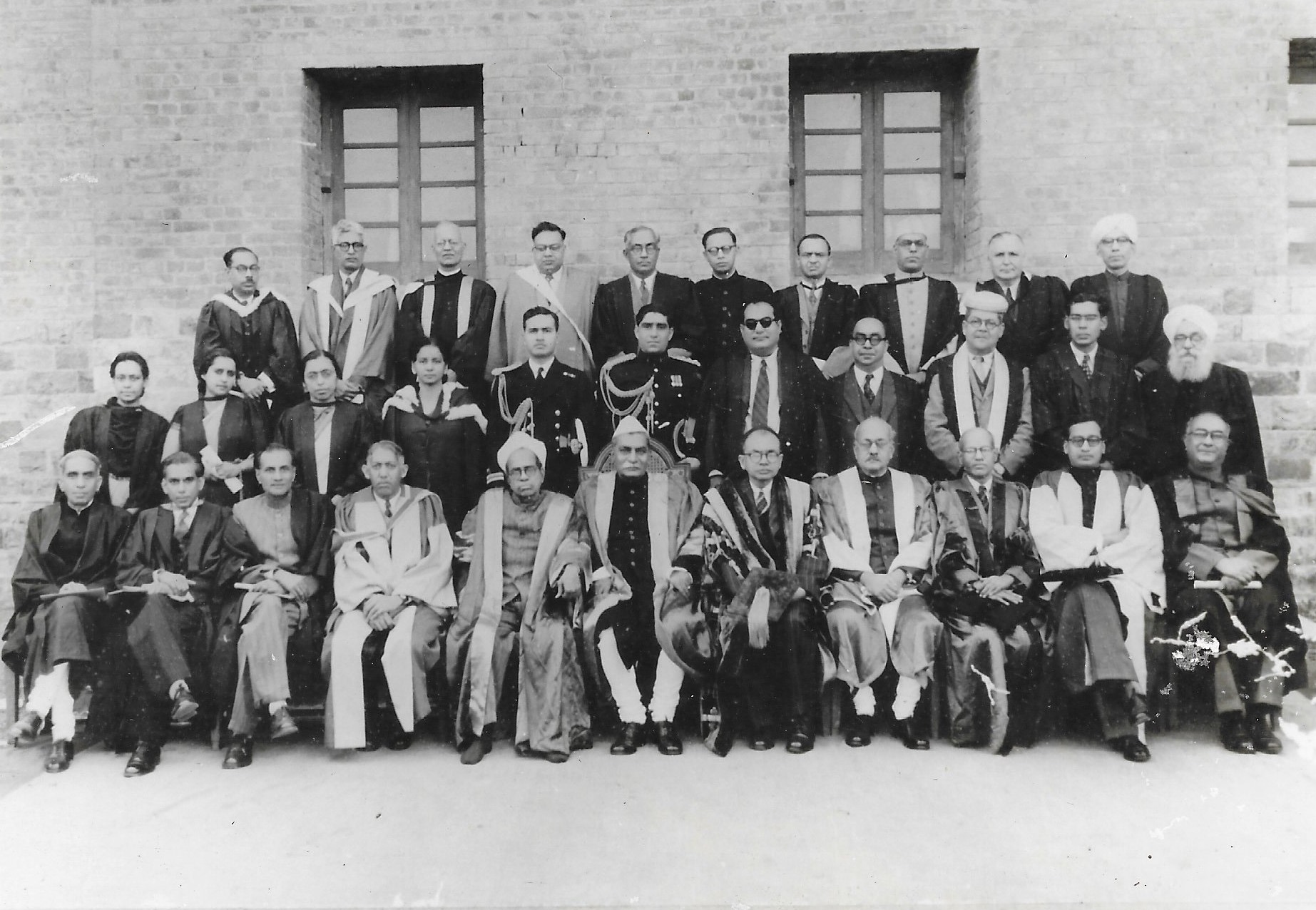 |
| Delhi University Convocation delegates - After the Constitution of India was ratified on Jan 26, 1950, two persons were awarded Honorary Doctorates at the Convocation of the University of Delhi in Nov 1951. They were the President of India Rajendra Prasad (seated in the Center), and Sir Alladi Krishnaswami Iyer (to his left) |
Selected Speeches
Namakaran of new Republic
HV Kamath: It is customary among most peoples of the world to have what is called a Namakaran or a naming ceremony for the new-born India as a Republic is going to be born very shortly and naturally there has been a movement in the country among many sections — almost all sections — of the people that this birth of the new Republic should be accompanied by a Namakaran ceremony as well. There are various suggestions put forward as to the proper name which should be given to this new baby of the Indian Republic. The prominent suggestions have been Bharat, Hindustan, Hind and Bharatbhumi or Bharatvarsh and names of that kind. At this stage it would be desirable and perhaps profitable also to go into the question as to what name is best suited to this occasion of the birth of the new baby — the Indian Republic. Some say, why name the baby at all? India will suffice. Well and good. If there was no need for a Namakaran ceremony we could have continued India, but if we grant this point that there must be a new name to this baby, then of course the question arises as to what name should be given..”
Genesis of Bharat
HV Kamath: “Now, those who argue for Bharat or Bharatvarsh or Bharatbhumi, take their stand on the fact that this is the most ancient name of this land. Historians and philologists have delved deep into this matter of the name of this country, especially the origin of this name Bharat. All of them are not agreed as to the genesis of this name Bharat. Some ascribe it to the son of Dushyant and Shakuntala who was also known as “Sarvadamana” or all-conqueror and who established his suzerainty and kingdom in this ancient land. After him this land came to be known as Bharat. Another school of research scholars hold that Bharat dates back to Vedic……..”, he said.
“India, that is, Bharat” is a clumsy one,
HV Kamath: I only wish to refer to the Irish Constitution which was adopted twelve years ago. There the construction of the sentence is different from what has been proposed in clause (1) of this article. I feel that the expression “India, that is, Bharat” — I suppose it means “India, that is to say, Bharat” — I feel that in a Constitution it is somewhat clumsy; it would be much better if this expression, this construction were modified in a constitutionally more acceptable form and may I say, in a more aesthetic form and definitely in a more correct form. If honourable colleagues in the House would take the trouble of referring to the Irish Constitution passed in 1937, they will see that the Irish Free State was one of the few countries in the modern world which changed its name on achieving freedom; and the fourth article of its Constitution refers to the change in the name of the land. That article of the Constitution of the Irish Free State reads as follows : “The name of the State is Eire, or, in the English language, Ireland.” I think that this is a much happier expression that “Bharat, or, in the English language, India, shall, be and such”. I say specifically the English language. Why ? Because Members might ask me, why do you say “the English language” ? Is it not the same in all European languages ? No, it is not. The German word is ‘Indien’ and in many parts of Europe the country is still referred to as in the olden days as “Hindustan” and all natives of this country are referred to as Hindus, whatever their religion may be. It is quite common in many parts of Europe. It must have come from the ancient name Hindu, derived from the river Sindhu. To sum up, I think that the construction of this clause “India, that is, Bharat” is a clumsy one, and I do not know why the Drafting Committee has tripped. In this fashion, has committed what is to me a constitutional slip. Dr. Ambedkar has admitted so many slips in the past, I hope that he admits this one too, and revises the construction of this clause..”
“Bharat known as India also in foreign countries’
Seth Govind Das: “Naming has always been and is even today of great significance in our country. We always try to give a name under auspicious stars and also try to give the most beautiful name, I am glad to find that we are giving the most ancient name to our country but, Dr. Ambedkar will excuse me, we are not giving it in as beautiful a way as it was necessary. “India, that is, Bharat” are not beautiful words for, the name of a country. We should have put the words “Bharat known as India also in foreign countries”. That would have been much more appropriate than the former expression. We should however, at least have the satisfaction that we are today giving to our country the name of Bharat. I was the first man to raise two questions in the Constituent Assembly; the first was with regard to the National language and the second with regard to the name of the country. We have solved the question of the National language and we are naming our country today. Therefore this day appears to be of great significance.”
India does not occur in our ancient books
Seth Govind Das: “There should be something on record in this connection and therefore I shall submit a few words and shall take only a few minutes. Some people are under the delusion that India is the most ancient name of this country. Our most ancient books are the Vedas and now it is being recognised that they are the most ancient books of the world. No mention of India is to be found in the Vedas. The words “Idyam” and “Idanyah” can be found in the Rig Veda and the words “Ida” in Yajur Veda. These words have no connection with India… Some people tell us so and in support of this a pamphlet has also been published in which an effort has been made to prove that “India”, is more ancient than “Bharat”. I want that it should be on record that this is incorrect. “Idyam” and “Ide” mean fire. “Idenyah” has been used as an adjective of fire and “Ida” signifies voice… The word India does not occur in our ancient books. it began to be used when the Greeks came to India. They named our Sindhu river as Indus and India was derived from Indus. There is a mention of this in Encyclopaedia Britannica. On the contrary, if we look up the Vedas, the Upanishads the Brahmanas and our great and ancient book the Mahabharat, we find a mention of the name Bharat.”
We should indeed give such a name to our country as may be befitting our history and our culture.
Seth Govind Das: A Chinese traveller named Hiuen-Tsang came to India and he has referred to this country as Bharat in his travel book. By my reminding the House of these ancient matters it should not be understood, as our Prime Minister and other Honourable Members say, that I am looking backward. I want to look forward and I also want that there should be scientific inventions in this country. But by naming our country as Bharat we are not doing anything which will prevent us from marching forward. We should indeed give such a name to our country as may be befitting our history and our culture. It is a matter of great pleasure that we are today naming our country as Bharat. I said many a time before too that if we do not arrive at correct decisions in regard to these matters the people of this country will not understand the significance of self-government. We fought the battle of freedom under the leadership of Mahatma Gandhi by raising the slogan of “Bharat Mata Ki Jai”. It is a matter for pleasure that we are going to do a correct thing today. But I would like to say that we are not doing it in a beautiful way. Why whatever way we may do it, our country is going to get the name of Bharat. I am confident that when our Constitution will be framed in the national language this name of Bharat will occupy its rightful place. I am very much pleased to note that whatever manner it may be, the name Bharat is being given to our country. I heartily congratulate the Constituent Assembly on it.”
Kallur Subba Rao (Madras): “Sir, I heartily support the name Bharat. which is ancient. The name Bharat is in the Rig Veda, (vide Rig 3, 4, 23.4). “Oh, Indira all this progeny of Bharata”. Also in Vayu Purana the boundaries of Bharat also are given.. It means that land that is to the south of the Himalayas and north of the (Southern ocean) Samundras is called Bharat. So the name Bharat is very ancient. The name India has come from Sindhu (the Indus river), and we can now call ‘Pakistan as Hindustan because the Indus river is there. Sind has become Hind : as (‘sa)’ in Sanskrit is pronounced as (Ha) in Prakrit. Greeks pronounced Hind as Ind. Hereafter it is good and proper that we should refer to India as Bharat. I would request Seth Govind Das and other Hindi friends to name the language also as Bharati, I think for the name Hindi the name Bharati should be substituted, as the former denotes the Goddess of Learning.”
Kallur Subba Rao (Madras): “Our leaders also refer to this country as Bharat in their speeches. For some time, however, it was felt that this name may lead to some difficulties and there was some opposition to this name, but it is a matter for pleasure that we are going to accept the name Bharat without any opposition..”
This free country will regain its name
Kamalapathi Tripathi : “Mr. President, Sir, I am grateful to you for having given me an opportunity to express my sentiments on an amendment which I consider to be very sacred. Today an amendment regarding the name of the country is before us. I would have been glad if the Drafting Committee had presented this amendment in a different form. If an expression other than “India, that is, Bharat” had been used, I think, Sir, that would have been more in accord with the prestige and the traditions of this country and indeed that would have done greater honour to this Constituent Assembly also. If the words, “that is” were necessary, it would have been more proper to use the words “Bharat, that is, India” in the resolution that has been presented to us. My Friend, Mr. Kamath, has moved the amendment that the words. “Bharat as it is known in the English language India” should be used. It the Drafting Committee had accepted it, if it accepts it, even now, it would be given appreciable consideration to our sentiments and the prestige of our country. We would have been very glad to accept it. Still, Sir, we are pleased at the resolution that has been put before us and we congratulate the Drafting Committee on it. When a country is in bondage, it loses its soul. During its slavery for one thousand years, our country too lost its everything. We lost our culture, we lost our history, we lost our prestige, we lost our humanity, we lost our self respect, we lost our soul and indeed we lost our form and name. Today after remaining, in bondage for a thousand years, this free country will regain its name and we do hope that after regaining its lost name it will regain its inner consciousness and external form and will begin to act under the inspiration of its soul which had been so far in a sort of sleep. it will indeed regain its prestige in the world. The revolutionary movement that took place in the country by following the footsteps of Bapu, the Father of the Nation, made us recognise our form and our lost soul. Today it is due to him alone and due to his penance that we are regaining our name too.
Even after thousands of years our country is still known as ‘Bharat’.
Kamalapathi Tripathi: Sir, I am enamoured of the historic name of “Bharat”. Even the mere uttering of this word, conjures before us by a stroke of magic the picture of cultured life of the centuries that have one by. In my opinion there is no other country in the world which has such a history, such a culture, and such a name, whose age is counted in milleniums as our country has. There is no country in the world which has been able to preserve its name and its genius even after undergoing the amount of repression, the insults and prolonged salvery which our country had to pass through. Even after thousands of years our country is still known as ‘Bharat’. Since Vedic times, this name has been appearing in our literature. Our Puranas have all through eulogised the name of Bharat. The gods have been remembering the name of this country in the heavens. ….The gods have a keen desire to be born in the sacred land of Bharat and to achieve their supreme goal after passing their lives here. For us, this name is full of sacred remembrances. The moment we pronounce this name, the pictures of our ancient history and ancient glory and our ancient culture come to our minds. We are reminded that this is the country where in past ages great men and great Maharishis gave birth to a great culture. That culture not only spread over all the different areas of this land, but crossing its borders, reached every corner of the Far East too. We are reminded that on the one hand, this culture reached the Mediterranean and on the other it touched the shores of the Pacific. We are reminded that thousands of years ago, the leaders and thinkers of this country moulded a great nation and extended their culture to all the four corners of the world and achieved for themselves a position of prestige. When we pronounce, this word, we are reminded of the Mantras of the Rig Veda uttered by our Maharishis in which they have described the vision of truth and soul experience. When we pronounce this word, we are reminded of those brave words of the Upanishads which urged humanity to awake, to arise, and to achieve its goal. When we pronounce this word, we are reminded of those words of Lord Krishna through which he taught a practical philosophy to the people of this country — the philosophy which can enable humanity even to lay to achieve its goal of peace and bless. When we pronounce this word, we are reminded of Lord Buddha, who had boldly told men all over the world that. — ” (greatest good of the greatest number, greatest happiness of the largest number and the welfare of humanity) should be the watch-words of their lives and that they should awake and arise to promote the welfare of mortals and gods and to show to the world the path of knowledge. When we pronounce this word, we are reminded of Shankaracharya, who gave a new vision to the world. When we pronounce this word, we are reminded of the mighty arms of Bhagwan Rama which by twanging the chord of the bow sent echoes through the Himalayas, the seas around this land and the heavens. When we pronounce this word, we are reminded of the wheel of Lord Krishna which destroyed the terrible, Imperialism of Kshatriyas from India and relieved this land of its burden…”
As Tripathi continued to narrate the history and significance of the name ‘Bharat’, Dr. Ambedkar interrupted him and asked: Is this all necessary, Sir ? Tripathi then concluded by congratulating Dr. Ambedkar for including ‘Bharat’ as the name of the Country.
|
Bharat will be a great nation
Kamalapathi Tripathi: “…When we pronounce this word we are minded of Bapu who gave a new message to humanity….We are pleased to see that this word has been used and we congratulate Dr. Ambedkar on it. It would have been very proper, if he had accepted the amendment moved by Shri Kamath, which states “Bharat as is known in English language ‘India’ ”. That would have preserved the prestige of this country. By the inclusion of the word ‘Bharat’ and by accepting it, we shall be able to give to this country a form and to give back to it its lost soul and we shall be able to protect it also. Bharat will be a great nation and will be able to serve humanity on a world wide scale.”, he concluded.
India, a name given by foreigners
Har Govind Pant: “So far as the word ‘India’ is concerned, the Members seem to have, and really I fail to understand why, some attachment to it. We must know that this name was given to our country by foreigners who, having heard of the riches of this land, were tempted towards it and had robbed us of our freedom in order to acquire the wealth of our country. If we, even then, cling to the word ‘India’, it would only show that we are not ashamed of having this insulting word which has been imposed on us by alien rulers. Really, I do not understand why we are accepting this word.”,
Bharat” or “Bharat Varsha” in place of ‘India’.
Har Govind Pant: “Mr. President, during the early sittings of the Assembly I had moved an amendment to the effect that for the name of the country, we should have the word “Bharat” or “Bharat Varsha” in place of ‘India’. I am gratified to see that some change in the name has at last been accepted. I, however, fail to understand why the word ‘Bharat Varsha’ is not acceptable to the House when the importance and glory of this word is being admitted by all here. I do not want to repeat what the other Members have said in regard to the acceptance of this glorious word, but I would make only a few observations in respect of this word. ‘The word “Bharat” or “Bharat Varsha” is used by us in our daily religious duties while reciting the Sankalpa. Even at the time of taking our bath we say in Sanskrit : “Jamboo Dwipay, Bharata Varshe, Bharat Khande, Aryavartay, etc.” It means that I so and so, of Aryavart in Bharat Khand, etc……….. The most celebrated and word-famous poet Kalidasa has used this word in his immortal work depicting the story of his two great characters — King Dushyanta and his queen Shakuntala. The son born of them was named ‘Bharat’ and his Kingdom was known as “Bharat”. There are many fascinating descriptions of the heroism of Bharat in our ancient books. It is said that in his childhood he used to play with lion cubs and overpowered them. We are well acquainted with the story of Bharat.
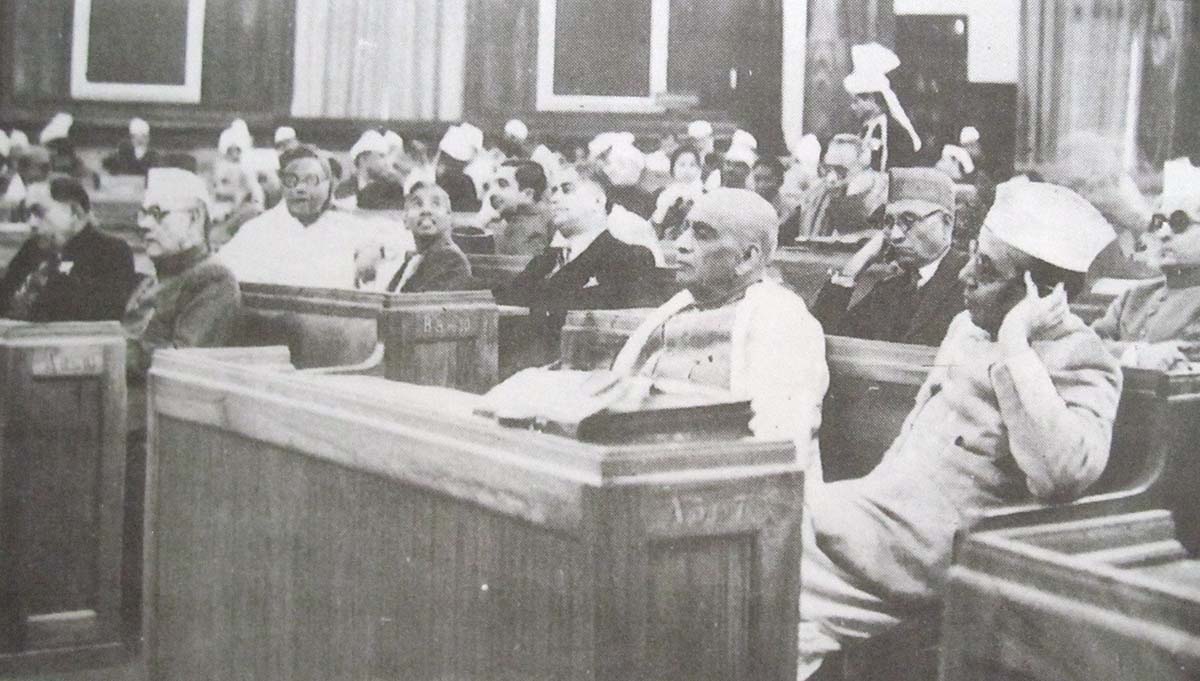 |
| Council House, Raisina Hill, New Delhi |
Name of our country should be ‘Bharat Varsha’ and nothing else.
Har Govind Pant: “I fail to understand, in view of all this, why we are reluctant to accept, from the core of our heart the word ‘Bharat Varsha’ as the name of our country. So far as the word ‘India’ is concerned, the Members seem to have, and really I fail to understand why, some attachment for it. We must know that this name was given to our country by foreigners who having heard of the riches of this land were tempted towards it and had robbed us of our freedom in order to acquire the wealth of our country. If we, even then, cling to the word ‘India’, it would only show that we are not ashamed of having this insulting word which has been imposed on us by alien rulers. Really, I do not understand why we are accepting this word. ‘Bharat’ or ‘Bharat Varsha’ is and has been the name of our country for ages according to our ancient history and tradition and in fact this word inspires enthusiasm and courage in us; I would, therefore, submit that we should have no hesitation at all in accepting this word. It will be a matter of great shame for us if we do not accept this word and have some other word for the name of our country. I represent the people of the Northern part of India where sacred places like Shri Badrinath, Shri Kedarnath, Shri Bageshwar and Manasarovar are situated. I am placing before you the wishes of the people of this part. I may be permitted to state, Sir, that the people of this area want that the name of our country should be ‘Bharat Varsha’ and nothing else.”
World will call us as India and we ourselves will call us as Bharat
Pandit Thakur Das Bhargava: “As regards the name of the country the term “India that is Bharat” has been laid down in the Constitution and some of my friends objected to this term. As for me, I have no serious objection to it. It is a fact that we cannot live in isolation from the rest of the world; we have centuries old connections with England and the rest of the world. The world will always know us by the name of India. But so far as we are concerned, in our hearts and souls our country shall always remain as Bharat. So the term India and Bharat have been bracketed in order to meet the needs of our countrymen as well as of the outsiders. The world will call us as India and we ourselves will call us as Bharat. Thus there will be a blending of the East and the West.” (18th Nov 1949)
We have failed very badly in giving it a proper name
Algu Rai Shastri said that the assembly failed very badly in giving it a proper name. “Sir, a matter of deep sorrow and deep regret for me that we in this country did not rise above the slave mentality and we did not say frankly what would be the name of our country. I think, Sir, there is no single country of the world which has such a clumsy name as we have given to our land that is ‘India, that is Bharat’. The fact, Sir, is it is no name at all and we have failed very badly in giving it a proper name.”, he opined.
Rohini Kumar Chaudhury (Assam) said: It fills our heart with joy when we consider that once more this ancient land which was hitherto known as India only will be known as Bharat.
Mohammad Tahir (Bihar) said that it is a proof of the intelligence of Dr. Ambedkar, that he suggested a hotch-potch sort of name and got it accepted. “Well, if somebody would have asked Doctor Saheb about his home land he could have replied with pride that he belonged to Bharat or India or Hindustan. But now the Honourable Dr. will have to reply in these words : “I belong to India that is Bharat”. Now, Sir, it is for you to see what a beautiful reply it is.”
Some other members also raised their concern about the name. “I would have liked the name ‘Bharat’ to come before India. It is a fact that ‘Bharat’ and India have come in, but I would have liked ‘Bharat’ to come before India.”, Jagat Narain Lal, a member from Bihar said.
HV Kamath again raised another concern. According to him, a comma between the word ‘that is’ and Bharat would make it perfect. “Sir, the Draft as passed by the House reads, “India, that is, Bharat . . . . . ”. The revised draft presented to the House says, “India, that is Bharat . . . . . ”. That I do not think is what was intended by the House when we accepted article 1. What was meant was, India, that is to say, Bharat. That is why two commas were inserted and the phrase was interposed. I do not mean, “India, that is Bharat,”. This is wrong English, so far as the meaning intended is concerned. I think the original was perfectly correct and it was absolutely wrong on the part of the Drafting Committee to change the wording.”, he said. However, this suggestion also got rejected.
‘Bharat’ at other places
Article 393 of the Constitution, defines its short title as ‘This Constitution may be called the Constitution of India’. One member suggested that it should be ‘Constitution of India, that is Bharat’. But this was not accepted. The assembly also voted against Pandit Govind Malaviya’s amendment to the preamble for substituting ‘We the People of India’ to ‘We the people of Bharata (India)’. Prof. Shibban Lal Saksena had also made a similar suggestion.
In the Hindi version of the Constitution, Article 1(1) begins with भारत, अथार्त् इंिडया (means: Bharat, That Is India). Wherever the word ‘India’ occurs in the Constitution, the translated version uses ‘Bharat’. The preamble also begins like this: हम, भारत के लोग, भारत को एक…
Caselaws
As this part of Article 1 is only about the name of the nation, it needed no interpretation from the Supreme Court or High Courts. However, recently, one lawyer moved a plea seeking name change. He referred to constituent assembly debates to contend that the name “India” was a sign of colonial hangover, and was not authentically reflecting the cultural heritage of the country. Refusing interference in this matter, the court asked the Central Government to treat a writ petition seeking direction to change the name of the country as “Bharat” from “India” as a representation and to take a decision on the same.
References:
 Support Us
Support Us
Satyagraha was born from the heart of our land, with an undying aim to unveil the true essence of Bharat. It seeks to illuminate the hidden tales of our valiant freedom fighters and the rich chronicles that haven't yet sung their complete melody in the mainstream.
While platforms like NDTV and 'The Wire' effortlessly garner funds under the banner of safeguarding democracy, we at Satyagraha walk a different path. Our strength and resonance come from you. In this journey to weave a stronger Bharat, every little contribution amplifies our voice. Let's come together, contribute as you can, and champion the true spirit of our nation.
 |  |  |
| ICICI Bank of Satyaagrah | Razorpay Bank of Satyaagrah | PayPal Bank of Satyaagrah - For International Payments |
If all above doesn't work, then try the LINK below:
Please share the article on other platforms
DISCLAIMER: The author is solely responsible for the views expressed in this article. The author carries the responsibility for citing and/or licensing of images utilized within the text. The website also frequently uses non-commercial images for representational purposes only in line with the article. We are not responsible for the authenticity of such images. If some images have a copyright issue, we request the person/entity to contact us at This email address is being protected from spambots. You need JavaScript enabled to view it. and we will take the necessary actions to resolve the issue.
Related Articles
- How Britishers were challenged by 83 year old Ropuiliani in Mizoram in 1892-’93
- Hindus documented massacres for 1000s of years: Incomplete but indicative History of Attacks on India from 636 AD
- "Study the past if you would define the future": Discover India's Cultural Legacy: Yuge Yugeen Bharat National Museum - a majestic panorama of 5000 years of Indian civilization & heritage, literature, science, evolution of empires, struggles, and triumphs
- A new symbol of Hindutva pride, Shri Kashi Vishwanath Temple Corridor
- Winston Churchill's hate for Indians caused millions of deaths: A villainous supremacist
- Hero of Pawankhind: Veer Maratha Bajiprabhu Deshpande, who led 300 Soldiers against 12000 Adilshahi Army defending Shivaji
- Birsa Munda: The tribal folk hero who was God to his people by the age of 25
- Can Communism and Democracy Coexist - 100 Years of Russian Revolution
- Prophecies of Jogendra Nath Mandal getting real after seventy years of his return from Pakistan
- Paramahansa Yogananda: Spiritual journey of a saint who was known as The Father of Yoga in the West
- Operation Trident,1971: How Indian Navy Pulled Off One Of Its Greatest Victories over Pakistan, Karachi burned for seven days
- Was Italian family of Sonia Gandhi involved in the Bofors scam: Papers long buried, questions that were never asked
- The Untold Story of the Brave Maratha Warrior Queen Ahilyabai Holkar!
- Saraswathi Rajamani, at 16, became the youngest and first female spy for INA, boldly recruited by Netaji in 1942, courageously spent two years spying on the British in Myanmar during WWII, a pivotal yet overlooked heroine in India's struggle for freedom
- Assam King Prithu who badly defeated Bakhtiyar Khilji, destroyer of Nalanda University in Battle of Kamrup in 1206 CE



